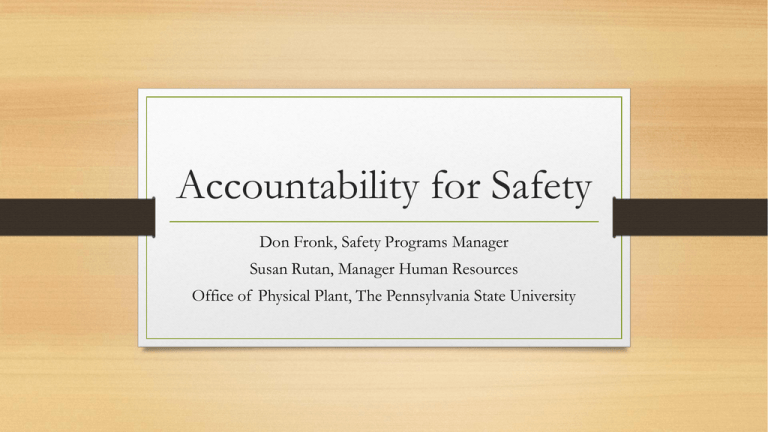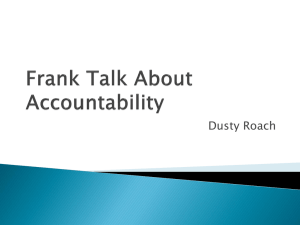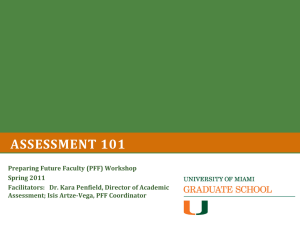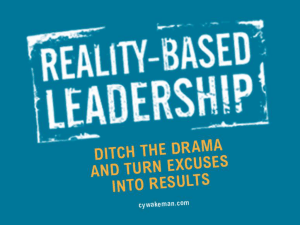Accountability for Safety
advertisement

Accountability for Safety Don Fronk, Safety Programs Manager Susan Rutan, Manager Human Resources Office of Physical Plant, The Pennsylvania State University Objectives • Provide a framework for developing a safety accountability program • Share our story – what we have done, the impact & lessons learned • Motivate YOU to enhance or develop a safety accountability program Program Agenda • • • • • • Create a common understanding of accountability (What?) The case for safety accountability (Why?) The basic steps for growing safety accountability (How?) The players (Who?) Our Story Discussion Understanding Accountability (The What) • Personal accountability • Workplace accountability • Safety accountability The Case for Safety Accountability (The Why) • Safety accountability helps protect people • Accountability for safety moves the culture forward Basic framework for safety accountability (The How) • • • • • • Leadership commitment Safety programs THE FOUNDATION- Robust training & education SAFETY CULTURE Employee involvement Clear expectations and roles Encouragement and enforcement SAFETY ACCOUNTABILITY MODEL Players in developing safety accountability (The Who) • • • • • • • Senior management HR management – if not part of senior management Safety management & staff Mid-management Front line supervisors Union – depending on contractual language Employee (safety committees) THE PENN STATE STORY Penn State Office of Physical Plant Story • The foundation – growing our safety culture • Senior leadership focused on safety & communication of the commitment • Safety programs developed, documented, communicated & available • Robust training & informational programs • Employee involvement Senior Leadership Commitment • OPP Vision Statement – We are recognized nationally for excellence in facilities, environmental & safety management. • OPP Guiding Principles – We provide an enjoyable, healthy, and safe work environment. • OPP Quality Service Action Plan – Safe Environment (Providing for the health and safety of people and the environment through daily work processes, environmental protection, maintenance practices, and facilities design. Senior Leadership Commitment Office of Physical Plant Safety Mission Statement OPP’s employees are its cornerstone. Employee safety is a core value of OPP and is crucial to its success. It is every employee’s responsibility to help create and foster a proactive safety mindset while actively working to make OPP a safer place to work. All employees must embrace the idea of working safely at all times. Expectations to accomplish this mission are: All employees will be involved and actively participate in our safety programs. Each employee must make safety planning a significant part of any job process, before the work starts. All employees will be responsible and accountable for their personal safety, as well as the safety of those around them. Every employee is empowered and encouraged to speak up when encountering an unsafe situation or act. Every leader will provide necessary safety resources and take responsibility for making improvements to the workplace so work can be performed safely. These efforts will foster a safety culture throughout the organization and result in fewer employees being injured at work. Senior Leadership Commitment • OPP Performance Criteria • Resource Commitment • 4 full-time safety professionals (for 1300 FTE workforce) • Org-wide funding set-aside for safety (programmatic & facilities) • Unit operational budgets funded for safety training Safety Programs • Safety program development and review teams include employees • Safety programs accessible on the web upon implementation Safety Programs • • • • • • Electrical Safety / Arc Flash Control of Hazardous Energy Excavation Safety Confined Space Fall Protection Scaffolding Robust Safety Training & Information • OSHA awareness training for all employees • OSHA 30 hour outreach training for all trades supervisors, managers and project leaders • • • • OSHA 10 hour outreach training for design staff Safety awareness training for new employees Ongoing programmatic training (trade specific) and annual refreshers Supervisor’s toolbox talks and bi-monthly safety training topics New Employee Awareness Training Trade-specific training matrix Core Training Matrix Input Form Assessment Team Trade Code Job Title Tim Zerby, Mike Kelleher, Wes Kaluzny, Mike Tepsic 323, 423, 923 Heating + Ventilation Course / Topic Area S-Lock Out/Tag Out S-Confined Space S-Fall Protection S-PPE Safety/Guidelines S-Back Safety and Lifting S-Aerial Lift Certification S-Hand Tool Safety S-Asbestros Awareness S-Respiratory Proetction/Fit Testing S-Hot Work Permit S-Chemical Waste Management S-NFPA 70E Frequency I,A I,A I,A I I,A I, 3 yrs I I,A I,A I I,A I Employee Involvement • ISP Participation • 92 hourly employees involved • Employees empowered to make decisions regarding safe work • Hazard assessments • Safety improvements to the work environment • PPE selection The Foundation is Built THE OPP SAFETY ACCOUNTABILTY MODEL • The Safety Accountability Matrix • The Mechanism for Accountability Building the Model of Safety Accountability • The Safety Accountability Matrix - Clarify expectations & roles • Identified the roles & expectations for each safety program area • Developed matrix Program Area HR / Safety Office Manager Personal Protective Equipment Program -Eye / face protection -Head protection -Respiratory protection -Hearing protection -Flash Gear -Protective footwear Develop, revise and evaluate program, develop and provide training, spec and approve PPE, work with OPP Stores to stock needed equipment, evaluate effectiveness of equipment, consult with Managers, Supervisors as the subject area expert. Have a thorough understanding of PPE requirements, conduct PPE Hold supervisors accountable Hazard assessments, assist for ensuring compliance with with training, ensure program and other safety compliance with the program, responsibilities, provide and hold employees funding. accountable. Who? All employees Driver Safety Who? All Employees Injury Reporting / Accident Investigation Who? All Employees Supervisor Employee Utilize appropriate PPE for task as identified in hazard assessment, complete medical surveillances as needed, maintain PPE in good condition, provide feedback on PPE type and styles. Develop and revise vehicle operation safety guidelines, consult with equipment custodian on vehicle Support guidelines, hold purchases, safety mechanism supervisors accountable for installs, review and track all ensuring compliance with vehicle accidents and work program and other safety with Risk Mgmt. on corrective responsibilities, provide actions. funding as needed. Ensure compliance with policies, wearing seatbelts, cell phone policy and other MV laws and hold employees accountable, file accident reports. Wear seatbelts, and follow OPP Vehicle safety guidelines. Comply with cell phone policy, report accidents and near misses. Review and approve all injury reports, assign / participate in accident investigations as necessary, perform trending Hold Supervisors accountable analysis, track injury data and for timely filing, and for provide to Managers, investigations, provide Supervisors for their units, funding for corrective action work with Supervisors on items that are within their area modified duty assignments. of responsibility. Report injury electronically within 24 hours, complete accident investigations assist in getting corrective action items completed, provide modified work assignments where possible. Report all injuries to Supervisor immediately when it occurs. Participate in the investigation and recommendations for corrective action. Program Area HR / Safety Office Electrical Safety Program (Mechanical Trades) Lock out Tag Out (All Trades) Manager Supervisor Employee Develop, revise and evaluate program develop Hold supervisors and provide training, work accountable for ensuring with electrical engineering compliance with program to determine hazard and other safety categories of electrical responsibilities, provide systems, spec, approve and funding, support de‐ purchase PPE, consult with energized work. Managers, Supervisors as the subject area expert. Have a thorough understanding of the program and consult with employees on basic safety questions, provide tools and equipment necessary for safe electrical work, ensure compliance with program, hold employees accountable. Understand and comply with program, wear appropriate clothing and PPE for troubleshooting. De‐ energize prior to working. Develop, revise and evaluate program, develop and provide training, issue locks and track lock assignments, consult with Managers, Supervisors as the subject area expert. Have a thorough understanding of the program and consult with employees on basic safety questions, provide equipment, ensure compliance with program and hold employees accountable, notify safety office of lock assignments. Understand and comply with program, wear appropriate PPE, verify energy sources are de‐ energized. Hold supervisors accountable for ensuring compliance with program and other safety responsibilities, provide funding. Building the Model of Safety Accountability • Develop mechanisms for accountability • Developed parameters for enforcement • Utilized existing employee recognition program • Get senior leadership buy-in on model & parameters for enforcement OPP Parameters for Enforcement • Conversation (undocumented) • • • • 1st violation of most PPE usage (except Flash gear and Fall Protection) Letter of conversation • 2nd violation of most PPE usage (accumulated for any type of PPE violation) • Failure to follow safety policy or procedure Warning letter • Failure to wear PPE to that could result in serious injury or death (w/ last chance warning) • Failure to follow safety procedures that could result in serious injury or death (w/ last chance warning) • Repeated or willful violations of safety policies or procedures (accumulated for any type of violation) Summary dismissal/dismissal • Willfully engaging in behavior that creates a life/safety hazard for themselves or others • Repeat violations of safety policies or procedures (3 active WL language) • Repeat violation of those things listed under W.L. with last chance warning Launching the Safety Accountability Model • Communication with all supervisors (train the trainer format) • Communication with union leadership • Supervisors communicated safety responsibility matrix with all employees Growing the Culture of Safety Accountability • • • • Highlight in new employee orientation Hold employees accountable under the model Review and update of Safety Responsibility Matrix Train new supervisors on the model and parameters for enforcement Impact of Safety Accountability Model • • • • Positive trend of injury reduction Increase of safety reports by employees Demonstrates organizational focus on safety Forces clarity in safety programs and policies Increase in safety reports • Employee safety reports have increased over the last several years Impact of Safety Accountability Model • • • • Positive trend of injury reduction Increase of safety reports by employees Demonstrates organizational focus on safety Forces clarity in safety programs and policies Lesson Learned • • • • • Keep safety staff out of enforcement Supervisor/manager input on parameters for enforcement Ensure training reflects expectations and document attendance Highlights supervisors who are reluctant to hold employees accountable Holding injured employees accountable is really tough Questions/Discussion









